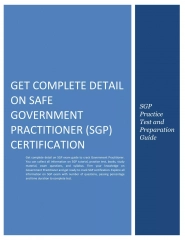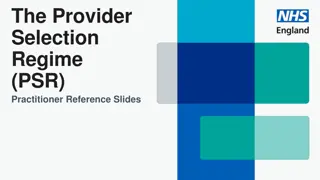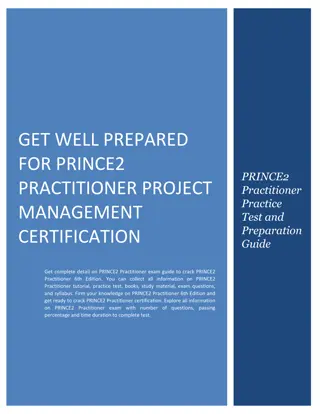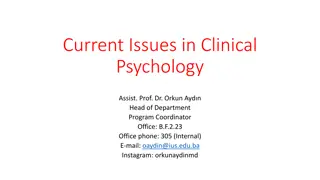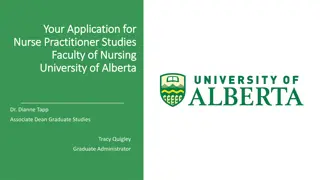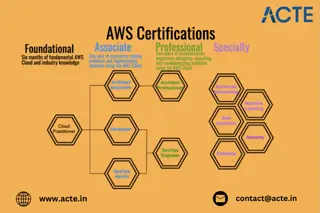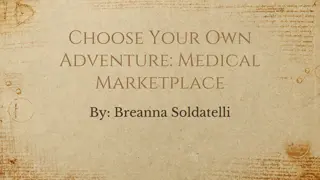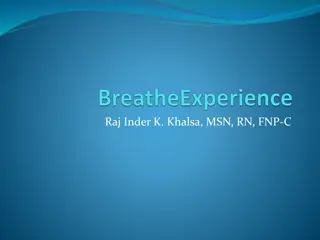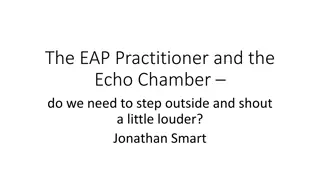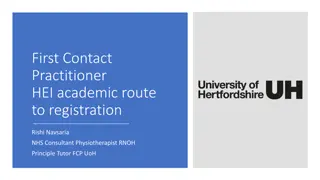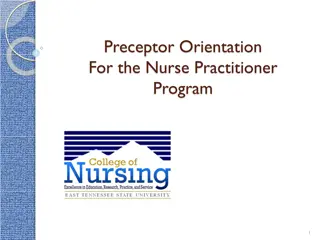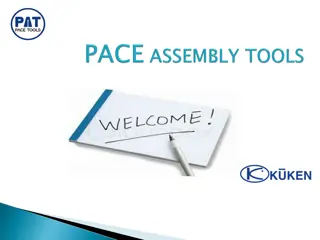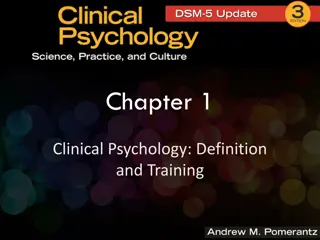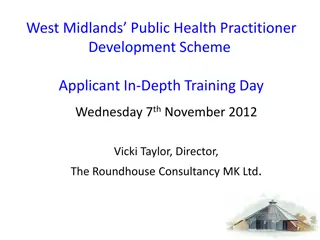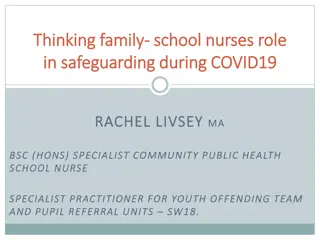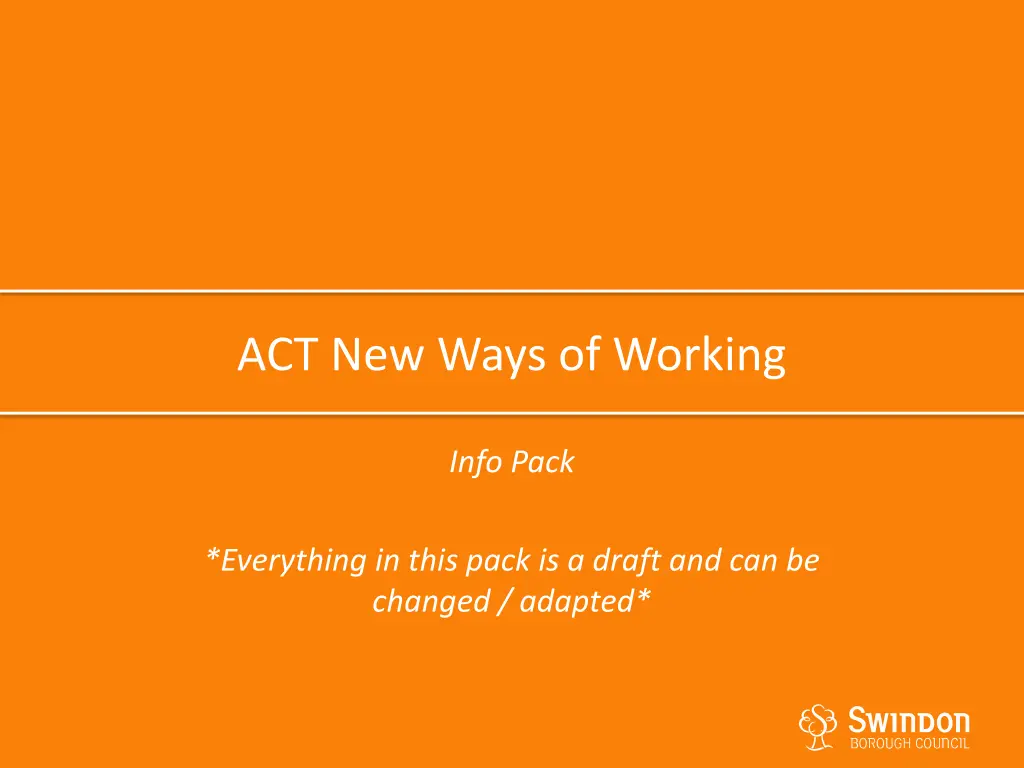
New Ways of Working: Maximizing Independence and Support Services
Explore the ACT Decision Making Process for enhancing client independence, discover supported living services, and learn how to assist individuals like Muriel in moving towards independent living through innovative support strategies.
Download Presentation

Please find below an Image/Link to download the presentation.
The content on the website is provided AS IS for your information and personal use only. It may not be sold, licensed, or shared on other websites without obtaining consent from the author. If you encounter any issues during the download, it is possible that the publisher has removed the file from their server.
You are allowed to download the files provided on this website for personal or commercial use, subject to the condition that they are used lawfully. All files are the property of their respective owners.
The content on the website is provided AS IS for your information and personal use only. It may not be sold, licensed, or shared on other websites without obtaining consent from the author.
E N D
Presentation Transcript
ACT New Ways of Working Info Pack *Everything in this pack is a draft and can be changed / adapted*
Summary: ACT Decision Making Process How do we maximise the independence of our clients? Check ideal achieved Front Door Review progress Triage Visit Set Ideal Review 3 conv. model Allocate as a last resort ATM/TM set priority Morning meeting check if should be allocated Discuss steps to establish how to maximise independence At visit establish strengths and past baseline Establish if can use convo. 1 to achieve baselines Establish if can use convo. 2 to achieve baselines Consider formal care as a last resort Morning meetings/long meeting Introduce case with client strengths and current thinking based on 3 conversations Group set ideal outcome ATM/TM logs independent outcome Review in morning meetings/long meetings Check ideal outcome was achieved at authorisation Log reason why it wasn t achieved if so Monthly case reviews to establish most independent outcomes are being achieved P/2 Strictly Private and Confidential
Supported Living SBC or block funded services. I.e no further implication Nursing Care Day Centre / Services Whitbourne Outer ring requires additional funding and increase to budget/spend Firethorn Fessey Reablement Edge Hill Respite Beds Direct Payments Residential Care Voluntary Organisations Extra Care Info & Advice Main- steam Stock-line Equipment Rapid Response Day Centre vv Harry garret Newburgh The Ridings Maple Court Sign Post Individual Service Fund Bridging Community Navigators Over Night Service Adaptions Swindon Support Residential Reablement Shared Lives Community Meals Main-stream Domiciliary Care Transport Telecare Support above Residential and Strictly Private and Confidential Nursing P/3
MurIeL - Moving to Independent Living How do we practically use Muriel? 1) What are the Service User s unmet needs/aspirations? Have these changed since the last review? 2) Could the Service User move up an Independence level by creative support planning? Could they be reabled? What to look out for! Direct payment We would expect large changes here on particularly overdue cases Informal care Have we made use of the informal care available? Telecare Could we use telecare? Two carer package Could some tasks be completed by one carer? Ancillary services cleaning, laundry visits. Could they be combined into other visits? Reablement could we use Reablement at review?
MurIeL - Moving to Independent Living What can we do at each level to promote independence? Fully Independent Fully Independent Bespoke Equipment, Information Advice and Guidance Family & Friends Support Rovi / sensory impairment Community Support Swindon Hub, Live Well service, Support groups, Volunteering services Telecare and Re-abling services SBC involvement SBC involvement equipment Reablement, Health partners, Rovi / sensory impairment, Rehab, OT involvement Formal Support at home + Informal care Any one new in the area? Can family or friends manage some needs with Respite? Formal support at home Shared Lives, Telecare, Frequent reviews with contingency, Merge visits together Extra care / Sheltered Housing
Assessment Quality Checklist Criteria Bronze Silver Gold Assessment Framework Did the assessment adequately consider: 1. Adults ability to be involved and support provided where substantial difficulty is identified. 2. Adults strengths 3. Adults needs (carer neutral) 4. All those with a caring responsibilities identified and evidence carers assessment offered (joint/separate) Insufficient level of attention paid to one or more of the four framework areas All four areas covered in some detail but depth of information / analysis lacking in some areas All four areas covered in good level of detail both in terms of data capture and analysis / interpretation Views of Adult & Carer Were the views of the adult/carer adequately captured and used to inform plan? Views of adult and carer/s clearly present and some mention of Adults views Voice of adult clearly evident throughout assessment and plan, as well as those of carer/s Views of adult and carer/s missing All statements about risks & issues facing the adult in the assessment are backed up by firm evidence and good analysis of what is factual and what is hypothetical Evidence based Do we make a clear distinction between the facts we know and the hypotheses that we think we know? This may include input from other professions (Physiotherapist; Psychologist etc.) Assessment shows signs of evidence gathering to back up key points but facts are confused with hypotheses Most of the key statements in the assessment are backed up by clear factual evidence Eligibility criteria applied 1. All domains of the eligibility criteria completed (with evidence of how these are met) 2. Well-being principle evidenced 3. If Carers Assessment completed carers eligibility criteria has been applied. Insufficient level of attention paid to one or more of the three framework areas All three areas covered in some detail but depth of information / analysis lacking in some areas All three areas covered in good level of detail both in terms of data capture and analysis / interpretation Support Planning Did the Support Plan adequately consider: 1) All care act eligible needs/outcomes captured and how these will be met. 2) If carer is providing support to meet needs/outcomes evidence that they are willing and able to do. 3) all the options considered prior to proposed/paid for services considered. Insufficient level of attention paid to one or more of the three framework areas All three areas covered in some detail but depth of information / analysis lacking in some areas All three areas covered in good level of detail both in terms of data capture and analysis / interpretation Majority of outcomes are not SMART , and/or plan contains actions where there should be outcomes Clear grasp of difference between outcomes and actions. Most outcomes are SMART Outcomes focussed Support Plan Does our plan have clear, SMART outcomes? All stated outcomes in plan are SMART Progress against plan frequently updated and clear evidence that outcomes have been reviewed and amended through journey Plan-Do-Review Do we review progress against our plan and the continued relevance of our outcomes? Progress against plan updated but outcomes not reviewed and updated frequently enough Limited evidence that plan has been updated after the initial version
The purpose of this decision tree is to clarify which cases we should be keeping open Caseload Decision Tree What should be on your caseload? P/7 Strictly Private and Confidential
Case Weighting Framework Points Criteria Review where risks are well managed and contact with other agencies is minimal or unproblematic 1 Assessment with lower level risks and contact with other agencies is minimal or unproblematic Review with risk assessment and / or contact with other agencies requires maintenance 2 Review / assessment including one of: Mental capacity assessment Human rights assessment Complex contact with families / multiple other agencies Complex mental health diagnoses / conditions Safeguarding Hoarding, self neglect or homelessness 3 Review / assessment including several of: Multiple parts of 3 Mental capacity assessment plus best interest meeting(s) Application for apps and depps Risk enablement panel Addiction 4 Review / assessment including several of: Multiple parts of 4 Other court involvement 5 P/8 Strictly Private and Confidential

